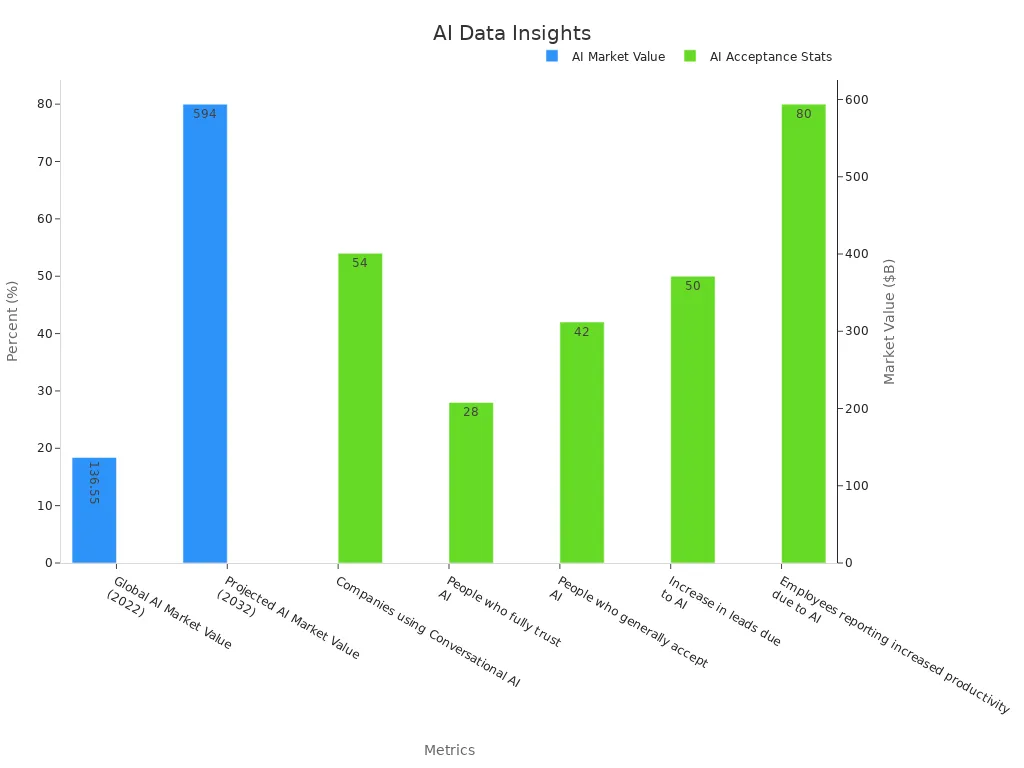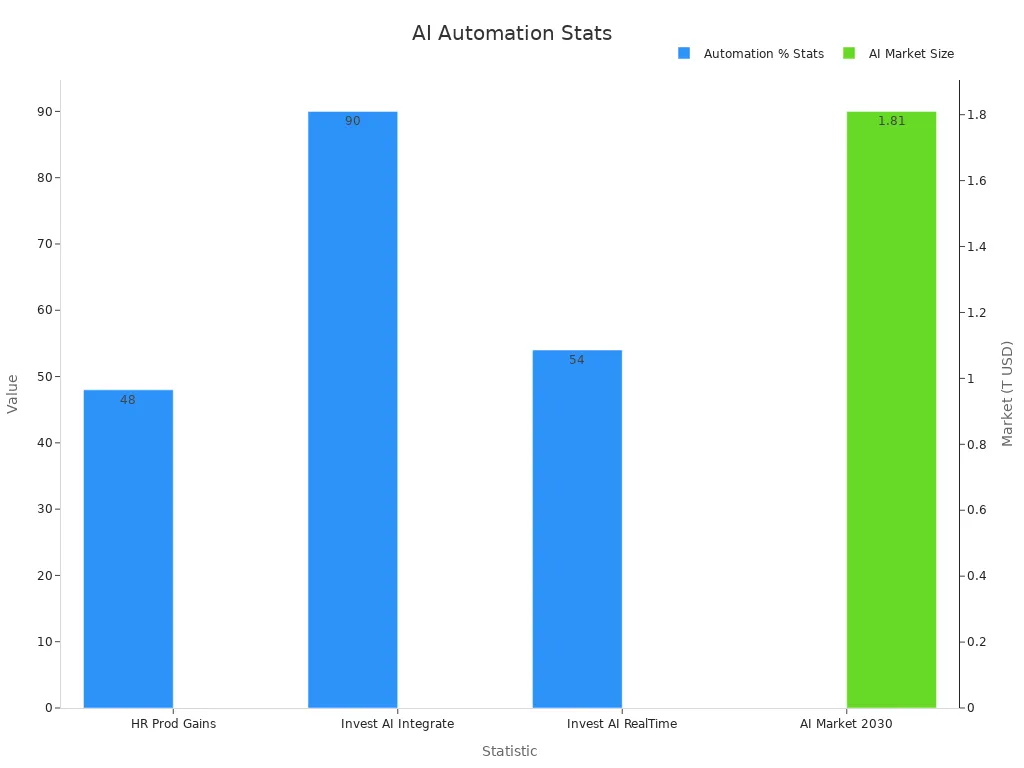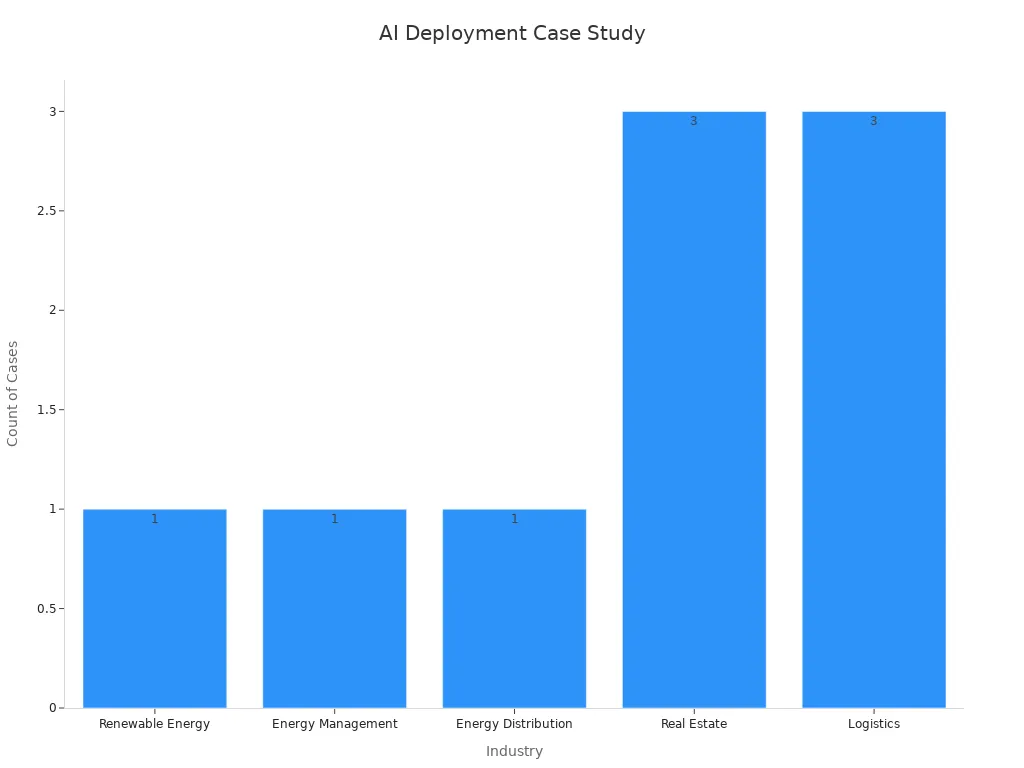
AI agents are intelligent systems designed to perform tasks autonomously, often mimicking human decision-making and problem-solving. You encounter their transformative impact in workplaces where mundane tasks are automated, freeing up time for strategic work. For example, a bank reclaimed 1.5 million hours through automation, boosting productivity. Companies using AI agents report revenue increases of up to 10%, showing their potential to reshape workflows and improve efficiency. As the AI market grows from $1.6 billion in 2024 to $13.5 billion by 2030, these agents will redefine how you approach work.
Key Takeaways
-
AI tools handle boring tasks, so workers can do important jobs. This helps everyone get more done.
-
Using AI tools can save money and help make better choices by studying data.
-
Solving problems like keeping data safe and setup costs is key to using AI well in any company.
Understanding AI Agents and Their Unique Role
What Are AI Agents?
AI agents are autonomous systems designed to perform tasks intelligently and independently. Unlike traditional software, they perceive their environment, make decisions, and act to achieve specific goals. These agents rely on continuous learning to improve their performance over time. For example, conversational AI agents assist users by understanding natural language and generating responses, making them invaluable in customer service and support roles.
|
Statistic Description |
Value |
|---|---|
|
Global AI Market Value (2022) |
|
|
Projected AI Market Value (2032) |
$594 billion |
|
Companies using Conversational AI |
54% |
|
Employees reporting increased productivity due to AI |
80% |
AI agents embody intelligence through their ability to translate data into actionable insights. Whether managing workflows or automating repetitive tasks, they enhance productivity across industries.
How AI Agents Differ from Traditional AI Tools
AI agents surpass traditional AI tools in functionality and efficiency. While traditional tools often require manual input, AI agents operate autonomously, reducing administrative burdens. They provide continuous feedback, enabling immediate improvements, whereas traditional tools typically offer feedback annually.
|
Feature |
AI Agents |
Traditional AI Tools |
|---|---|---|
|
Significantly reduces time spent on admin tasks |
Often requires more manual input |
|
|
Bias-Free Evaluations |
Employs identical techniques for all employees |
Prone to human biases in evaluations |
|
Continuous, Actionable Feedback |
Provides regular feedback for immediate improvement |
Typically offers annual feedback |
|
Cost Reduction |
Minimizes costs through automation |
Higher costs due to manual processes |
|
Data-Driven Decision Making |
Relies on factual data for decisions |
Often based on subjective assessments |
AI agents also excel in data-driven decision-making, relying on factual insights rather than subjective assessments. This makes them a powerful tool for improving workplace efficiency and reducing costs.
The Evolution of AI Agents in the Workplace
The journey of AI agents in the workplace reflects decades of technological progress. Early systems focused on rule-based programming, capturing human knowledge through expert systems. Machine learning revolutionized AI by enabling systems to learn from data. Deep learning introduced advanced models that improved natural language understanding, paving the way for generative AI.
-
Expert Systems Era (1980s-1990s): Rule-based programs captured human expertise.
-
Machine Learning Revolution (1990s-2000s): Systems began learning from data rather than relying solely on programmed rules.
-
Deep Learning Breakthrough (2010s): Advanced architectures improved natural language processing.
-
Generative AI: Creativity entered AI, enabling original content production.
-
AI Agents: Autonomous systems capable of decision-making and task execution emerged.
Today, AI agents save time and improve productivity for 90% of workers. By 2028, they will autonomously make 15% of day-to-day work decisions, transforming the workforce and redefining workplace dynamics.

Transforming the Workforce with AI Agents

Automating Routine Tasks
AI agents excel at automating repetitive and time-consuming tasks, allowing you to focus on more strategic responsibilities. By handling processes like data entry, scheduling, and customer inquiries, these agents significantly boost employee productivity and workplace efficiency. For example, HR teams report a 48% increase in productivity after implementing AI-driven automation tools. Similarly, 90% of investment managers now rely on AI for real-time data analysis, streamlining their operations and improving decision-making.
|
Statistic Description |
Value |
Source |
|---|---|---|
|
Expected global AI market size by 2030 |
||
|
Percentage of HR teams reporting productivity gains |
48% |
|
|
Percentage of investment managers integrating AI |
90% |
|
|
Percentage of investment managers using AI for real-time data analysis |
54% |
The benefits of AI agents extend beyond productivity. They also reduce operational costs by automating routine tasks. For instance, companies like Itaú Unibanco and Bank of America have saved millions annually by leveraging AI for fraud detection and customer service. These examples highlight how task automation can transform the workforce and maximize productivity.

Enhancing Decision-Making and Strategic Oversight
AI agents play a pivotal role in improving decision-making processes. By analyzing vast amounts of data in real time, they provide actionable insights that help you make informed choices. Research shows that AI agents' efficiency in decision-making often depends on their programmed personality traits. Agents with high openness to experience demonstrate better information acceptance, while cautious agents exhibit skepticism. This adaptability ensures that AI agents can cater to diverse business needs.
In strategic oversight, AI agents offer unparalleled autonomy. They operate independently, completing complex tasks within minutes or hours, depending on the mission's requirements. This capability allows you to focus on high-level planning while the agents handle operational details. Benchmarks like the EU AI Act and NIST guidance categorize AI systems based on their autonomy levels, ensuring safe and effective workforce integration.
-
Autonomy Levels: Defined by regulatory frameworks to assess independence from human intervention.
-
Operationalized Levels of Autonomy: Benchmarked against human performance to evaluate task completion times.
-
Protocols for Risk Evaluation: Developed to ensure AI systems operate safely and effectively.
By integrating AI agents into your decision-making processes, you can enhance HR and business operations, improve efficiency, and achieve better outcomes.
Real-World Examples of AI Agents in Action
The real-world applications of AI agents demonstrate their transformative impact across industries. In renewable energy, AI agents optimize solar and wind production by predicting peak efficiency periods. In logistics, they calculate efficient delivery routes, saving costs and improving service quality. Real estate companies use AI agents for property valuation, virtual tours, and tenant screening, enhancing user experience and operational accuracy.
|
Industry |
Use Case |
Description |
|---|---|---|
|
Renewable Energy |
Optimization |
AI agents predict peak efficiency periods for solar and wind production. |
|
Energy Management |
Demand Response |
AI agents balance energy supply and demand for grid stability. |
|
Energy Distribution |
Smart Grids |
AI agents enhance energy distribution and monitoring through IoT integration. |
|
Real Estate |
Property Valuation |
AI agents analyze market trends for accurate appraisals. |
|
Real Estate |
Virtual Property Tours |
AI-powered tours enhance buyer convenience and user experience. |
|
Real Estate |
Tenant Screening |
Automated agents ensure reliable tenant selection. |
|
Logistics |
Route Optimization |
AI agents calculate efficient delivery routes to save costs. |
|
Logistics |
Warehouse Management |
AI agents automate storage and retrieval for better inventory accuracy. |
|
Logistics |
Demand Forecasting |
AI agents predict inventory needs to meet customer expectations. |

These examples illustrate the benefits of AI agents in transforming the workplace. By automating tasks, enhancing decision-making, and improving strategic oversight, AI agents are shaping the future of work. Their adoption is not just a trend but a necessity for businesses aiming to stay competitive in a rapidly evolving market.
Addressing Challenges in AI Agent Adoption
Overcoming Data Privacy and Security Concerns
Data privacy and security remain significant challenges in AI agent adoption. The risks associated with AI usage are evident in cases like Samsung banning ChatGPT after an employee accidentally shared confidential code. This incident highlights the potential for severe data breaches. Additionally, 97% of organizations reported security incidents related to generative AI in the past year. These statistics emphasize the importance of implementing robust security measures.
To address these concerns, you can adopt strategies such as encrypting sensitive data, conducting regular audits, and ensuring compliance with data protection regulations. By prioritizing these measures, you can mitigate risks and build a secure environment for AI integration.
Managing Implementation Costs
Implementing AI agents involves significant costs, which can vary by industry and use case. For example:
|
Industry |
Use Cases |
Estimated Cost |
|---|---|---|
|
eCommerce |
Customer service, recommendations |
|
|
Insurance |
Claim bots, customer service |
$35,000 – $55,000 |
|
Real Estate |
Property matching, scheduling |
$30,000 – $45,000 |
Hidden costs, such as model retraining, cloud hosting, and compliance upkeep, can further impact budgets. To manage these expenses, you should evaluate your business needs, prioritize high-impact use cases, and explore scalable AI solutions. This approach ensures cost-efficiency while maximizing the benefits of AI agents.
Building Trust and Overcoming Resistance to Change
Resistance to AI adoption often stems from fear of job displacement and unfamiliarity with the technology. You can overcome this by fostering trust through transparent communication. Explain how AI will assist rather than replace employees. Comprehensive training programs can also empower your workforce to use AI tools confidently. Gradual implementation and showcasing early wins further ease the transition.
Surveys reveal that 72% of data experts believe businesses risk failure without AI adoption. Highlighting innovation and efficiency as key benefits can help you build confidence in AI technology and encourage its acceptance.
Strategies for Integrating AI Agents Effectively
Identifying Business Needs and Opportunities
Before integrating AI agents into your operations, you must identify the specific needs and opportunities within your business. AI tools can streamline data collection and enhance analytical capabilities, making them invaluable for market research. Some tools specialize in predictive analytics to forecast trends, while others excel in automation for efficient data gathering. Understanding the strengths of these tools allows you to tailor your approach to meet your objectives.
|
Benefit/Challenge |
Description |
|---|---|
|
Improved Efficiency |
AI agents automate labor-intensive tasks, allowing for faster data processing and freeing up resources for strategic decision-making. |
|
Enhanced Accuracy |
AI tools minimize manual errors and provide real-time updates, ensuring decisions are based on reliable data. |
|
Cost-Effectiveness |
By automating tasks, AI agents significantly reduce the manpower required for traditional market research methods. |
|
Real-Time Insights |
AI solutions offer continuous data updates, enabling proactive decision-making in changing market conditions. |
|
Addressing Data Processing Overload |
AI platforms streamline data handling, reducing bottlenecks and allowing for effective audience targeting. |
|
Overcoming Time Constraints |
Automation of research tasks helps in gathering data swiftly, accelerating strategy execution. |
When you evaluate your business needs, focus on areas where AI agents can deliver measurable value. For example, if your organization struggles with data overload, AI platforms can simplify data handling and improve decision-making. By addressing these challenges, you can unlock new opportunities for growth and efficiency.
Training Employees for a Hybrid Workforce
Integrating AI agents into your business requires preparing your workforce for a hybrid environment where humans and AI collaborate. Training programs play a crucial role in this transition. These programs should focus on helping employees understand how AI agents work and how to use them effectively. When employees feel confident in their ability to work alongside AI, they are more likely to embrace the technology.
To balance automation and human involvement, you can implement frameworks like Human-in-the-loop (HITL) and Human-on-the-loop (HOTL). These frameworks ensure that while AI handles repetitive tasks, humans remain involved at critical decision points. This approach maintains oversight and accountability, fostering trust in the technology.
Additionally, ethical considerations should be part of your training. AI systems can inadvertently perpetuate biases present in their training data. By educating your workforce about these risks, you can promote a fair and inclusive work environment. Training employees to identify and mitigate these biases ensures that your AI agents operate responsibly and effectively.
Monitoring and Optimizing AI Agent Performance
Once AI agents are integrated into your operations, continuous monitoring and optimization are essential for maximizing their effectiveness. You can use various benchmarks to measure performance improvements:
-
Accuracy Metrics: Evaluate how well the AI agent understands and responds to user queries.
-
Efficiency Metrics: Track the speed and smoothness of the AI agent's operations.
-
Reliability Metrics: Assess the stability and consistency of the AI agent over time.
-
User Engagement Metrics: Measure how users interact with the AI agent.
-
Customer Satisfaction Metrics: Reflect user experience and satisfaction with the AI agent.
-
Business Outcome Metrics: Determine the success of AI agent integration in achieving business goals.
The integration of AI agents into your systems should allow them to access and utilize data from various sources, such as CRMs and emails. This seamless integration enables AI agents to become context-aware and action-oriented, which is crucial for delivering measurable value. Regular audits and updates to the AI systems ensure they remain aligned with your business objectives.
By monitoring these metrics and optimizing performance, you can ensure that your AI agents continue to enhance productivity and decision-making. This proactive approach helps you adapt to changing business needs and maintain a competitive edge.
The Future of Work with AI Agents

Predictions for AI Agent Integration
AI agents will play a transformative role in the future of work. By 2026, 82% of organizations plan to integrate AI agents for tasks like email generation, coding, and data analysis. Deloitte forecasts that 25% of enterprises using generative AI will deploy AI agents by 2025, with this figure rising to 50% by 2027. Gartner predicts that by 2028, at least 15% of daily work decisions will be made autonomously through agentic AI. These trends highlight the growing reliance on AI agents to streamline operations and improve decision-making.
Future advancements will include proactive AI agents capable of anticipating needs and hyper-personalization to deliver tailored solutions. Emotional intelligence in AI agents will enhance their ability to interact empathetically, while multimodal capabilities will allow them to process and respond to diverse inputs like text, voice, and images. As AI agents evolve, they will integrate more deeply with IoT devices, enabling seamless communication across platforms.
The Role of AI Agents in Shaping Hybrid Workforces
AI agents are redefining hybrid workforces by enhancing collaboration between humans and machines. Their ability to automate routine tasks allows employees to focus on complex responsibilities, boosting productivity. The impact of AI agents on hybrid efficiency, resolution speed, and cost-effectiveness is evident in the following metrics:
|
Description |
|
|---|---|
|
Hybrid Efficiency |
Compares AI-assisted workflows to human-only workflows in terms of speed, accuracy, and cost. |
|
Agent-Handoff Success Rate |
Measures whether AI escalations reduce or increase human workload and improve resolution quality. |
|
Employee Productivity Gains |
Assesses if employees can focus more on complex tasks rather than routine work. |
|
Cost Efficiency |
Evaluates the cost of resolving issues via AI agents compared to traditional human support. |
|
Resolution Speed |
Determines if AI agents reduce the average time to resolution, enhancing customer satisfaction. |
|
Revenue Impact |
Analyzes if AI agents facilitate additional sales or upgrades. |
These metrics demonstrate how AI agents optimize workflows and improve outcomes. By integrating AI agents, you can create a balanced workforce where humans and AI collaborate effectively.
Long-Term Benefits of Embracing AI Agents
Adopting AI agents offers significant long-term benefits across industries. They reduce errors in data processing, accelerate workflows, and ensure consistent performance. Businesses experience improved operational efficiency, cost savings, and enhanced customer satisfaction.
|
Description |
|
|---|---|
|
Business value contribution |
Customer impact, process efficiency, and cost reduction. |
|
AI operational performance |
Task accuracy, relevance, error rates, and run completion. |
|
Adoption and effectiveness |
Automation success rate, human override rate, and user engagement. |
AI agents also foster innovation by enabling employees to focus on strategic initiatives. As AI agents become more advanced, their reliability and adaptability will drive sustained growth and competitiveness. By embracing AI agents, you position your organization to thrive in the future of work.
AI agents revolutionize workplaces by automating tasks, enhancing decision-making, and improving efficiency. Addressing challenges like data privacy and implementation costs ensures smooth adoption. Businesses embracing AI gain scalability, cost savings, and agility. Transparent systems and regulatory compliance build trust, paving the way for sustained success in a competitive market.
FAQ
1. How can AI agents improve your daily work tasks?
AI agents automate repetitive tasks, analyze data, and provide actionable insights. This allows you to focus on strategic responsibilities and creative problem-solving.
2. Are AI agents difficult to integrate into your business?
No, AI agents are scalable and customizable. You can tailor them to your business needs and gradually implement them for seamless integration.
3. What industries benefit the most from AI agents?
Industries like healthcare, logistics, and finance benefit significantly. AI agents optimize workflows, enhance decision-making, and reduce operational costs in these sectors.
